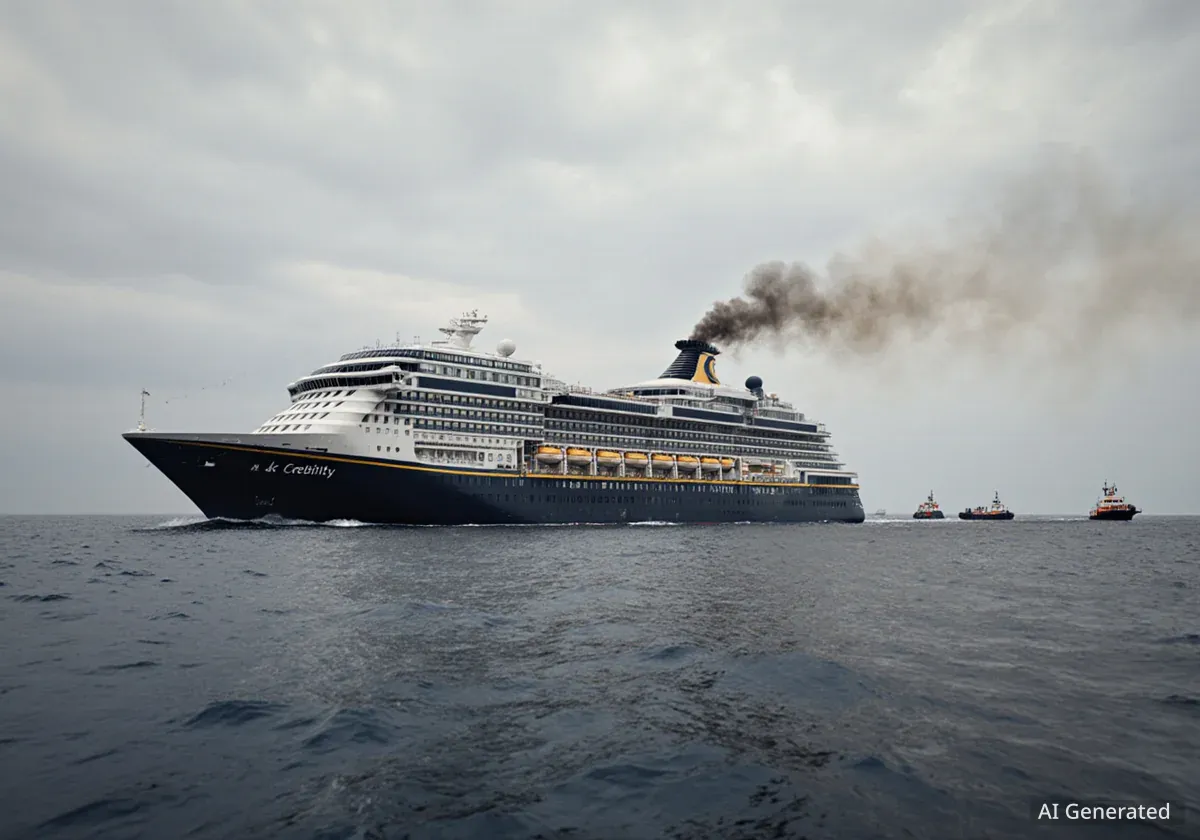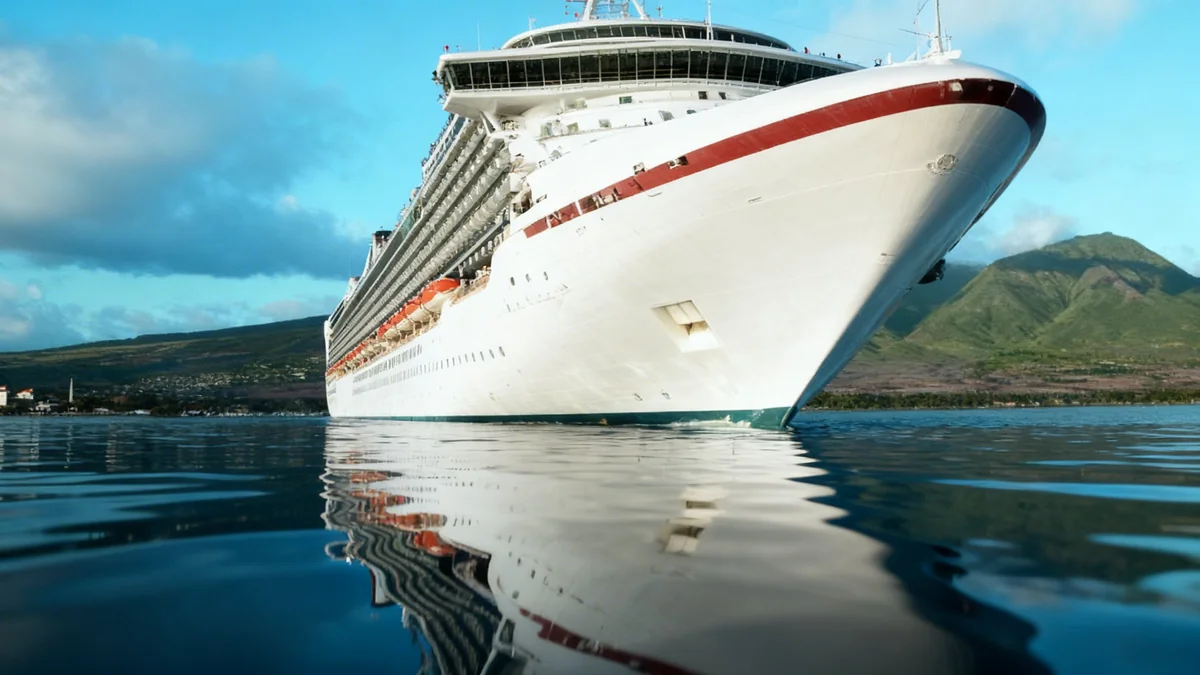A federal court in Miami has found Carnival Corp., the world's largest cruise company, liable for injuries sustained by a passenger during a fall on board the Carnival Celebration ship. The court ordered Carnival to pay the Miami woman nearly $350,000 in damages. This ruling, issued earlier this month, is notable because lawsuits against cruise lines rarely proceed to trial.
Key Takeaways
- Carnival Corp. was found liable for a passenger's fall on the Carnival Celebration.
- The passenger, Vivian Ruiz Rondon, was awarded $344,051.24 in damages.
- The incident occurred on May 12, 2023, due to a gap near a doorway threshold.
- Lawsuits against cruise companies rarely reach trial, making this decision significant.
- Carnival is reviewing the judgment and considering its options.
Details of the Incident and Court's Finding
The incident involved Miami resident Vivian Ruiz Rondon, 62, who was a passenger on the Carnival Celebration cruise ship. On May 12, 2023, she tripped and fell while walking through a doorway. The fall occurred near a threshold, which is an elevated metal piece located between passenger hallways and ship doors.
According to court documents, Rondon's right sandal and foot became trapped in a gap. This gap existed between the carpet and the metal of a loose doorway threshold on Deck 12 of the ship. She alleged that Carnival allowed this large gap to be present and failed to mark the area as dangerous or block it off.
Judge Roy Altman of the U.S. District Court for the Southern District of Florida issued the ruling on September 4. The judge determined that Carnival was at fault for the conditions that led to Rondon's fall.
"Rondon undoubtedly deserves some damages," Judge Roy Altman stated in his ruling. "The Defendant, after all, agrees that she suffered three sets of serious injuries from her fall: a fractured right arm; a dislocated right shoulder; and partial tears to two rotator-cuff tendons (the subscapularis and the infraspinatus.)"
Injuries and Awarded Damages
Vivian Ruiz Rondon sustained serious injuries from the fall. These included a fractured right arm, a dislocated right shoulder, and partial tears to two rotator-cuff tendons: the subscapularis and the infraspinatus. These injuries were acknowledged by Carnival's legal team during the proceedings.
The court awarded Rondon a total of $344,051.24 in damages. While this is a substantial amount, it is significantly less than the nearly $14 million she had initially sought. Her lead attorney, John H. Hickey, founder of Miami-based Hickey Law Firm, expressed satisfaction with the liability finding but acknowledged the discrepancy in the damages awarded.
Key Facts
- Plaintiff: Vivian Ruiz Rondon, 62, Miami resident.
- Ship: Carnival Celebration, homeported at PortMiami.
- Date of Incident: May 12, 2023.
- Cause of Fall: Tripped on a gap between carpet and a loose metal threshold on Deck 12.
- Injuries: Fractured right arm, dislocated right shoulder, partial tears to two rotator-cuff tendons.
- Damages Awarded: $344,051.24.
Carnival's Response and Legal Strategy
In response to the judgment, a Carnival spokesperson provided an emailed statement to the Miami Herald. The company stated, "We are considering the judgement, as well as the available options, to determine next steps." This indicates that Carnival may be evaluating an appeal or other legal avenues.
Throughout the case, attorneys representing Carnival, from Fowler White Burnett, P.A., argued that the cruise line was not responsible for Rondon's injuries. They contended that the alleged dangerous condition was "open and obvious." The defense argued that Rondon should have perceived the condition using her own senses.
Carnival's legal team asserted that "Plaintiff’s own negligence was the sole proximate cause of her injuries and damages." This defense strategy is common in slip-and-fall cases against cruise companies. However, in this instance, the court did not accept Carnival's arguments regarding liability.
Significance of the Ruling
This court decision holds particular significance within the maritime legal landscape. It is uncommon for lawsuits against cruise companies to reach a trial verdict. Martin Davies, the Niels F. Johnson chairperson in Maritime Law and director of the Maritime Law Center at Tulane University Law School, commented on this trend.
Davies, who was not involved in this specific case, noted that over 90% of civil cases, including those against cruise companies, typically end in settlements. Settlements are often preferred by companies because these agreements are usually kept confidential. This avoids public disclosure of specific incidents or payouts.
Cruise Ship Lawsuits
Most legal disputes against cruise lines are resolved through confidential settlements. This practice helps companies avoid public trials and potential negative publicity. The low number of cases that go to trial makes a public verdict of liability, like the one against Carnival, a notable event in the industry.
The "crystal clear" liability ruling against Carnival was a victory for the plaintiff, according to her attorney, John H. Hickey. He told the Herald that his client "feels vindicated" by the court's decision on liability.
While official statistics on slip-and-fall incidents on cruise ships are not maintained, Hickey mentioned that his firm is aware of at least eight other similar cases on the Carnival Celebration. These cases reportedly occurred between the ship's first voyage from PortMiami on November 21, 2022, and Rondon's cruise in May 2023. This suggests a potential pattern of similar incidents on the vessel.
What Happens Next?
Carnival Corp. is currently reviewing the judgment and evaluating its next legal steps. The company has several options, which could include filing an appeal to a higher court. Appeals can challenge either the liability finding, the amount of damages awarded, or both.
For Vivian Ruiz Rondon, the judgment provides a resolution to her claim of injury. However, the legal process may continue if Carnival decides to appeal. The outcome of any potential appeal would further shape the final resolution of this case.
This case serves as a reminder of the legal responsibilities of cruise operators to ensure passenger safety. It also highlights the complexities of maritime law and personal injury claims within the cruise industry.
The continued monitoring of similar incidents and their legal outcomes will be important for both passengers and the cruise industry. Such cases can influence safety protocols and liability standards across the sector.
The decision underscores that even major corporations can be held accountable in court for passenger injuries if negligence is proven. This outcome may encourage other passengers to pursue claims if they believe they have been injured due to a cruise line's negligence.





